On 7 February 2023, we commemorate the 100th anniversary of the death of John Denis (Jack) Fryer after whom the Fryer Memorial Library of Australian Literature is named.
Read Jack’s story: a man with a joy of life who died too young. A UQ student, a soldier in World War I and the inspiration for the creation of a Library now regarded as one of Australia's top 50 philanthropic gifts (PDF, 4.87MB).
About Jack Fryer
Early years
Jack was born on 11 September 1895 in Springsure, a Central Queensland town approximately 810 kilometres northwest of Brisbane. He was the fifth child in a family of six boys and one girl.
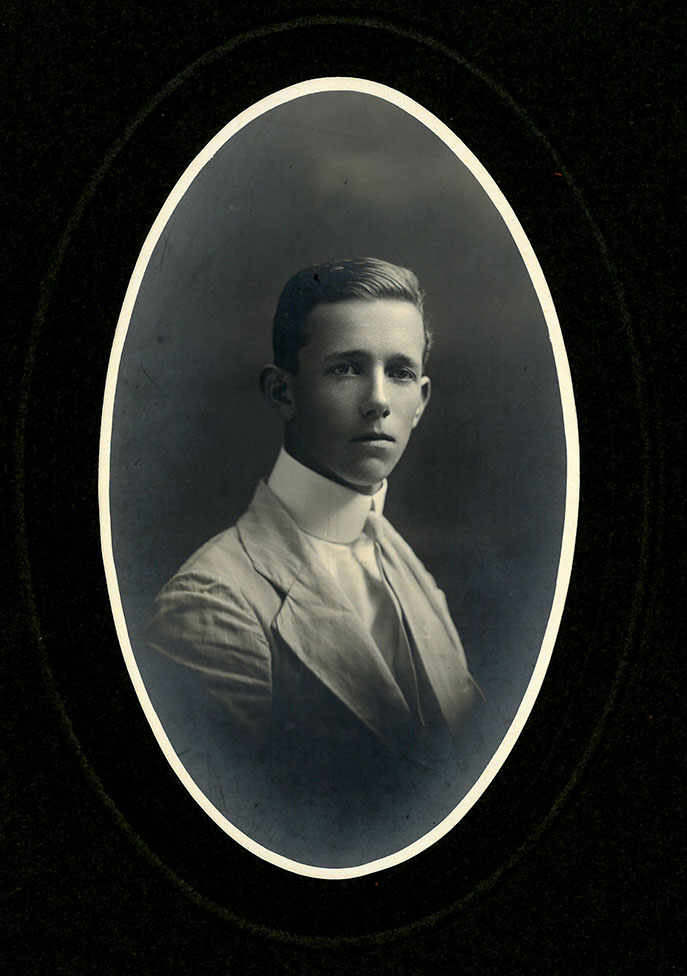
Both his parents worked at the local hospital. Charles George Fryer, his father, was wardsman, gardener, messenger, nurse to the male patients, and prepared prescription medications. Rosina (nee Richards), his mother, was a nurse who became matron of the hospital.
Schooling
Jack went to primary school in Springsure. A bright boy, he gained a scholarship to Rockhampton Grammar school in 1909 and matriculated in 1914.
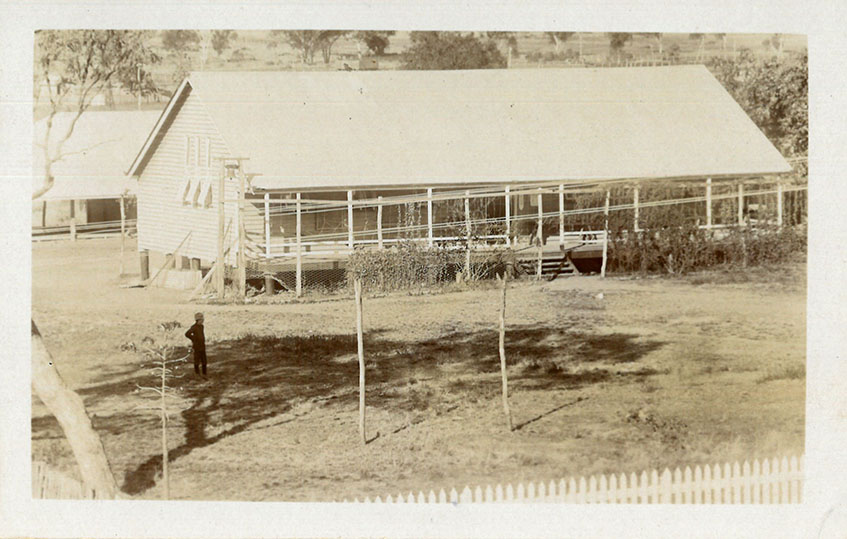
He also played for the School Tennis, Cricket, and Rugby teams.
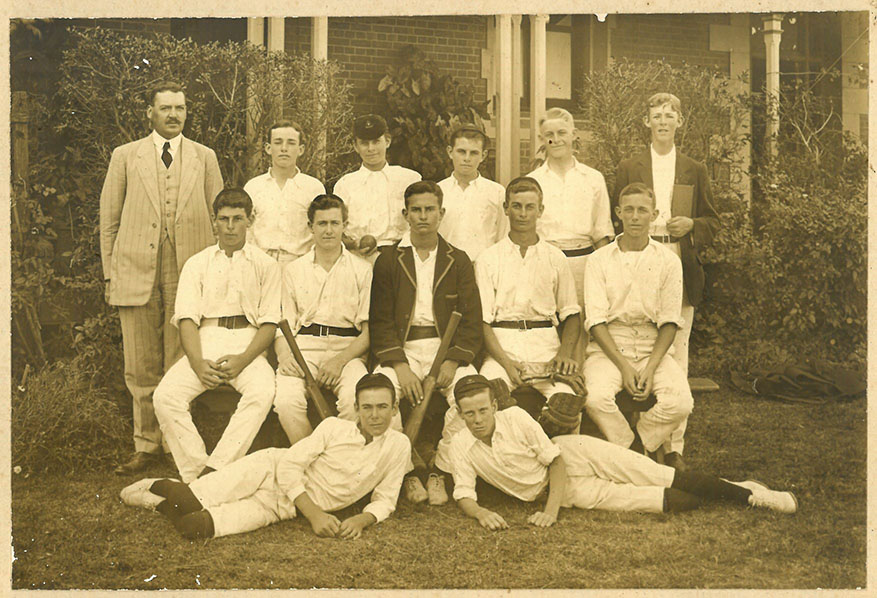
University
In 1915, aged 19, Jack was awarded a government scholarship of 52 pounds (about $7000 today) per year to study Classics at The University of Queensland.
After only one term, he enlisted to serve in World War I. Jack was among more than 150 students who enlisted in a cohort of less than 200.
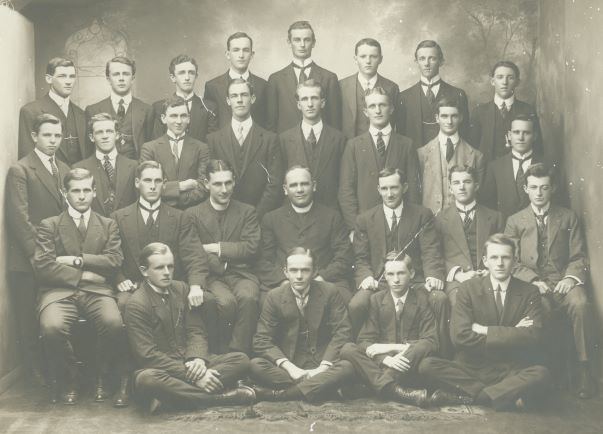
St John's College residents, University of Queensland, 1914 - UQ eSpace. Fryer Library University of Queensland Photograph Collection, UQFL466, AJ/P/123.
Military service
In late 1915, Jack departed Brisbane with his brother William on the Warilda, bound for the Suez. There, only six weeks after leaving Brisbane, he spent a month in hospital with mumps.
He served in Belgium and France. During his service, Jack reported gassing without evacuation from his battalion in October 1917.
In the final months of the war, he suffered gunshot wounds. He spent time in hospitals in Rouen, France, and London recovering until he was discharged. He continued to suffer from recurring boils, an indication of his reduced immunity.
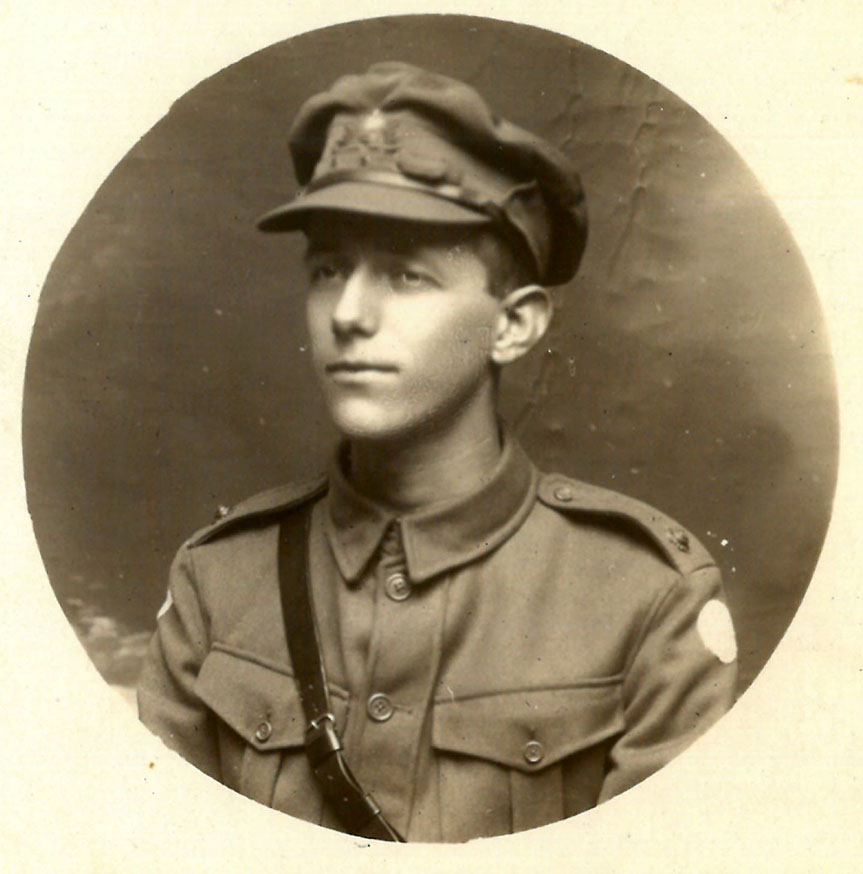
Jack returned home on the Orsava in 1919 and demobilised in August. His papers document his eagerness to return early for educational reasons.
Life as a UQ student
In March 1920, Jack resumed his Classics Honours degree at UQ. The University was located at the Old Government House Building in Brisbane City (Queensland University of Technology today). It was a much smaller community than now, where students and staff all knew each other.
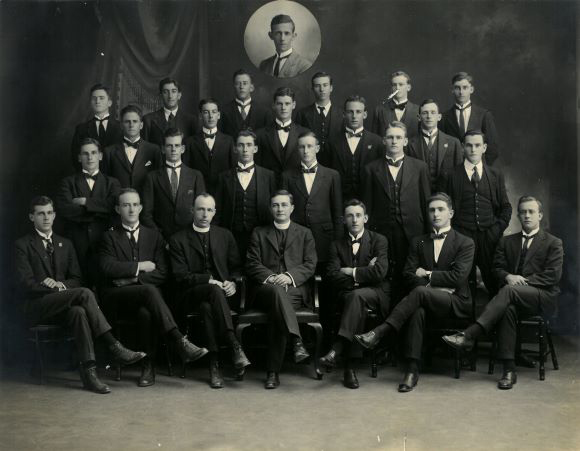
Jack embraced his studies and extracurricular activities. He edited the student magazine Galmahra, became Vice President of the UQ Dramatic Society and played for the UQ rugby and cricket teams.
In 1922, he became a student representative for the Advisory Committee of the Senate of the UQ (1922). In a letter to his mother, Jack discusses the many different responsibilities he had that year.
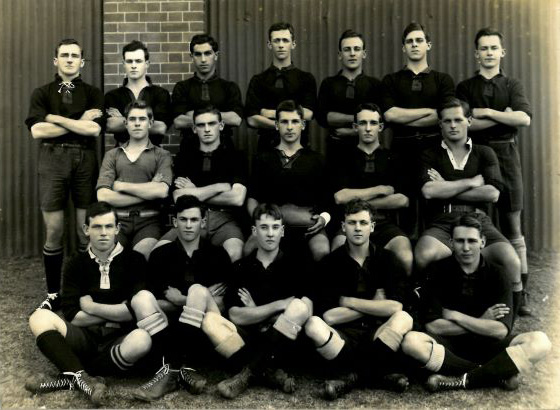
The 1920s were a time for the “bright young things” to make the most of life in the aftermath of a war that decimated a young generation. Jack enjoyed UQ’s social life and attended a number of events including dances and garden parties. The newspapers were the social media of the day, and document many of these social activities.
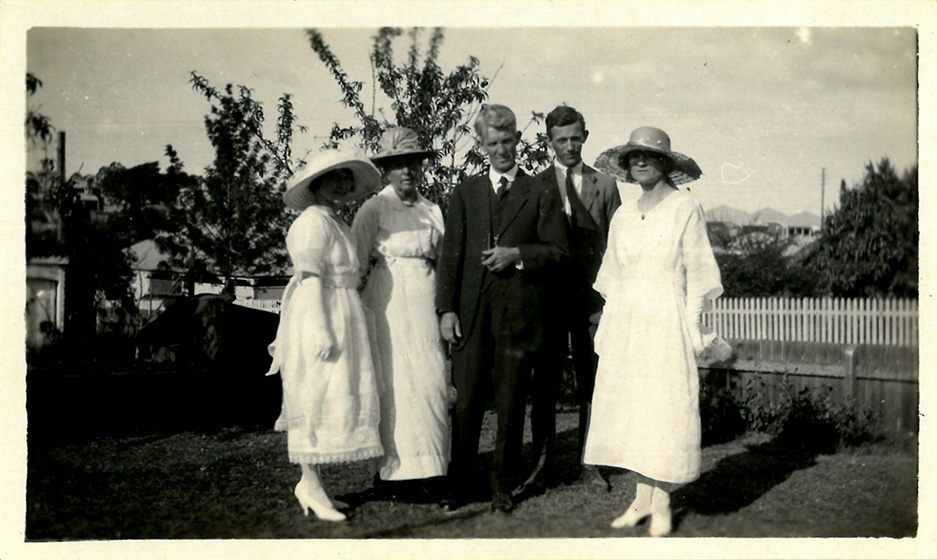
Called home
During 1922, Jack was becoming increasingly unwell. He was pale, easily fatigued, underweight and had a persistent cough. He was diagnosed with Tuberculosis (incurable at the time) in September and admitted to hospital and then to the Ardoyne Convalescent home.
It was determined that the tuberculosis was due to war service.
As he was unable to finish his degree, the University Senate awarded him his Bachelor of Arts degree on 15 December 1922. Lieutenant Fryer received his war medals at the Ardoyne Convalescent Home.
In his final weeks, Jack returned to Springsure. He died on 7 February 1923. He is buried in the local cemetery.
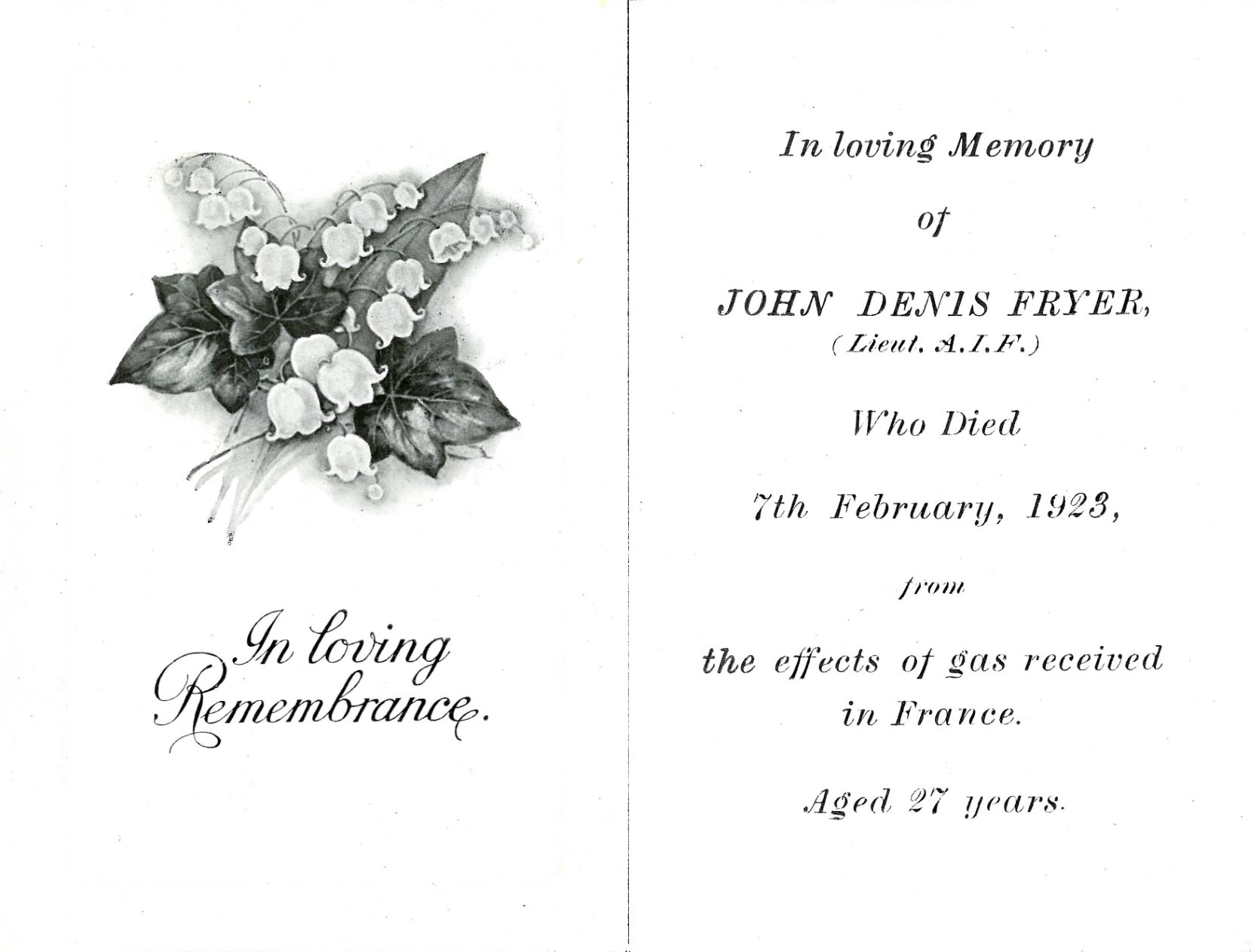
The card reads: "In loving Memory of John Denis Fryer (Lient, A.I.F), Who Died 7th February 1923, from the effects of gas received in France. Aged 27 years."
About the Fryer Memorial Library of Australian Literature, “The Fryer Library”
In memory of Jack, members of the University Dramatic Society (where he served as Vice President) donated 10 pounds (around $900 today) to establish a collection of works in Australian literature.
In 1927, the Fryer Memorial Library of Australian Literature was founded.
After reading an account of Fryer by one of his contemporaries, the original custodian of the Fryer Memorial Library, Dr FW Robinson commented:
"one feels that [he] is describing the 'Australian' or the 'Digger' at his best with his cheerfulness, sense of human values, fellowship, sacrifice and rest. Add his individual zest for learning, for literature, drama, as well as sport, and the name of Fryer for a library of Australian Literature acquires new significance”.
The Fryer Library continues to inspire today’s students, researchers, academics and the UQ community. The Fryer Library and the F.W. Robinson Reading Room is open by appointment Monday–Thursday. Keep an eye out for an upcoming display of Jack Fryer on level 1 of Duhig Tower Library.
Find out more
Check out the following collections and resources to learn more about Jack Fryer and the Fryer Library:
- Collection UQFL23 - Joyn Denis Fryer Papers
- Farley, Simon (2016). "Springsure's Fryer Brothers and the impact of medical treatment: A WW1 exhibition". Queensland's World War 1 Centenary. State Library of Queensland.
- Fryer, John Denis, 1895-1923 (1922). John Fryer, St John’s College, Brisbane to his mother, 2 Aug 1922 - UQ eSpace, John Denis Fryer Collection, UQFL23, Box 1, Folder 1b, item 6.
- McNeice, Laurie (2008). John Denis Fryer: a life remembered - UQ eSpace, Fryer folios 3 (1) 4-7.
- Robinson, FW (1952). 'The Fryer Memorial Library of Australian Literature', University of Queensland Gazette, no.24, November, pp. 8-9.
- Stride, P. (2020). Springsure Hospital 1864-1939: The Original Springsure Hospital and the Doctors and Diseases (PDF, 1.9MB), J Biogen Sci Res, 5, (12).
- University of Queensland Archives (2020). Faces of the Fallen booklet - UQ eSpace, University of Queensland Archives.
- University of Queensland. Library (2015). JD Fryer: Student and soldier - UQ eSpace.